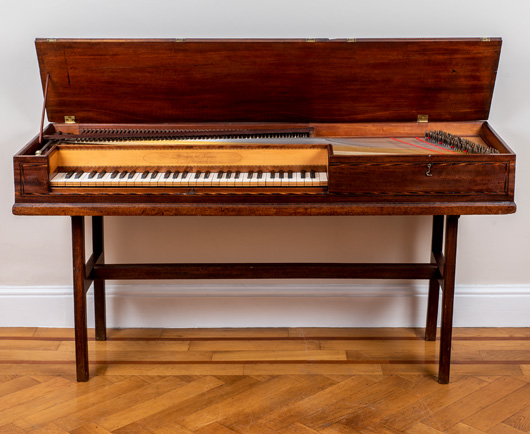Square piano by Longman & Broderip, London, c1780
Compass: FF (excl. FF⋕) - f '''
Zumpe’s first action.
Handstops for divided bass / treble dampers and for buff or ‘harp’ effect.
Compass: FF (excl. FF⋕) - f '''
Zumpe’s first action.
Handstops for divided bass / treble dampers and for buff or ‘harp’ effect.

‘Small’ or ‘square’ pianos were introduced commercially to England around the year 1766 by the émigré instrument maker, Johannes Zumpe. Their compact form, affordability and expressive qualities, which appealed to a changing aesthetic in keyboard music, made them a popular alternative to the spinet or harpsichord for domestic use. This example is typical of the square piano in its earlier incarnation and has Zumpe’s first action. Though technologically simple, this action is extremely efficient in its operation and remarkably robust; the relative directness of the connection between the player’s finger, the hammer and the strings through its fixed leather-dressed brass ‘jack’ or ‘pilot’ gives Zumpe’s first action an immediacy and a sense of being in close contact with the hammer. The action remained in use in square pianos even after the advent of John Geib’s escapement action in 1786, which introduced a sprung lever (later with a modification to prevent hammer repercussion) in substitution of Zumpe’s pilot to assist the player’s handling of the instrument’s dynamic range. This example is also fitted with handstops for raising the bass and treble dampers and for buff or ‘harp’ effect, which raises a batten dressed with a strip of leather and presses it against the strings to modify the sound produced in emulation of the harp. Although considered to provide a better accompaniment for the voice than plucked-string keyboard instruments, the piano existed on equal terms with the harpsichord and spinet for many years and music was written jointly for both types until around 1800 when commercial production of plucked-string keyboard instruments ceased in England.
There's nothing remarkable about it. All one has to do is hit the right keys at the right time and the instrument plays itself
Johann Sebastian Bach